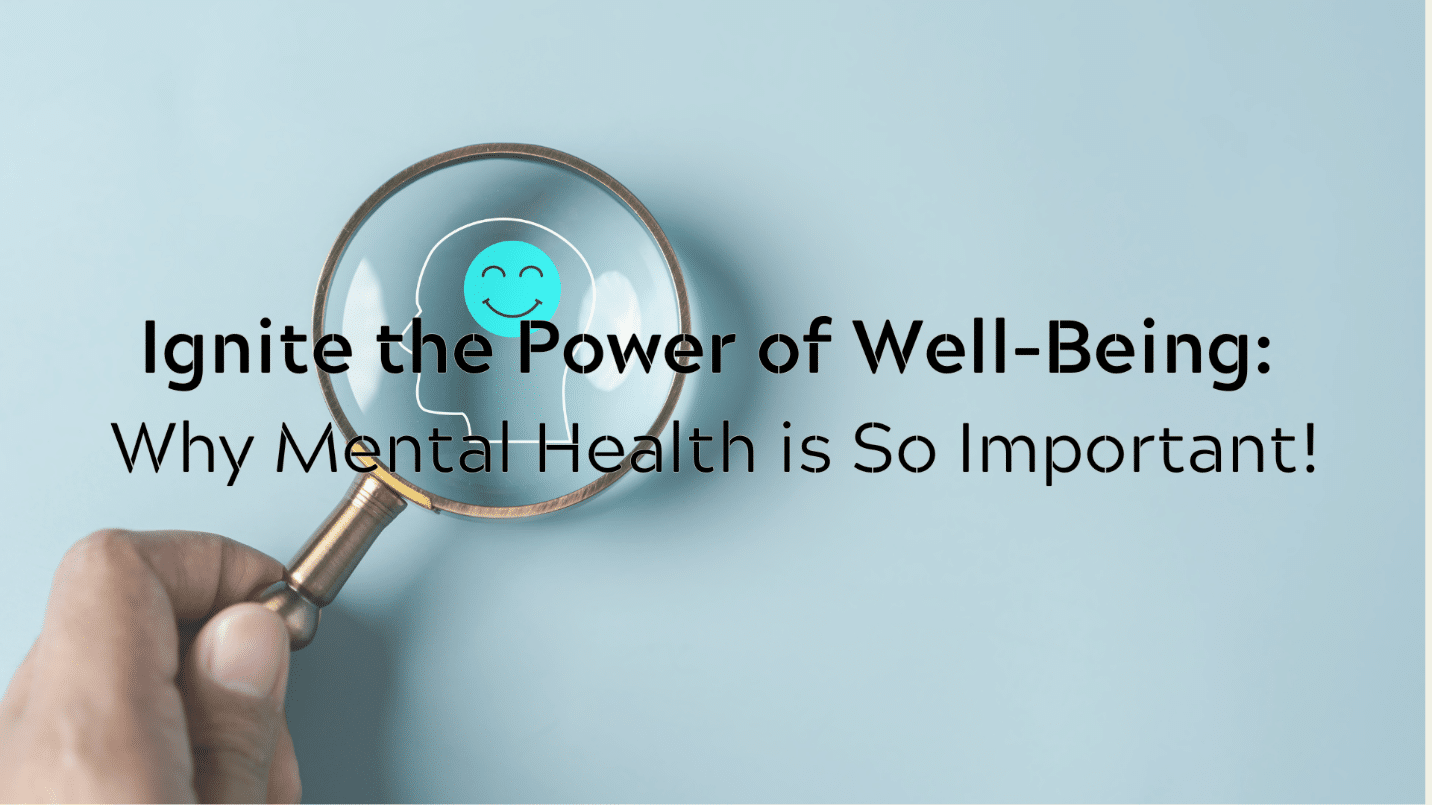Ignite the Power of Well-Being: Why Mental Health is So Important! Leave a comment
The progressive pace of our modern times requires mental health awareness to position itself as a crucial foundational concept. People tend to focus on physical health above all else, but they routinely disregard mental health because widespread confusion about its importance exists. Why mental health is so important is often overlooked, yet people require equal attention to their mental health since their mental condition rules all aspects of existence, starting with social bonds and continuing with occupational productivity. People face barriers to needed help because insufficient mental health knowledge interacts with public prejudice and skepticism.
Understanding Mental Health – Why Mental Health is So Important!
The status of psychological health can be characterized by how well a person manages their emotional functioning together with their psychological aspects as well as their social interaction skills. Our mental health affects how we think and react emotionally while determining our usual everyday activities. A doctor’s appointment dedicated to physical health screenings provides identical importance to mental health care since it begins to create equilibrium in life. Life quality becomes unstable, and so do jobs and relationships when mental health remains neglected. Mental health awareness can help create a better understanding of how mental health impacts every aspect of life.
People who have good mental health develop the ability to maintain a stable relationship between three essential mental functions while handling pressure and building relationships and making choices. Positive health recognized as mental wellness emerges from the integrated experience of well-being beyond illness absence.
People usually confuse mental health with mental illness. Some people make the mistake of thinking that mental health and mental illness describe two separate things, yet mental health describes personal emotional and psychological well-being, while mental illness means experiencing depression along with anxiety and schizophrenia disorders. A correct understanding of mental health distinctions from mental illness serves as a central strategy to fight stigma.

The Foundation of Overall Well-Being
- Mental Health and Emotional Balance
Mental health provides a fundamental base on which people build emotional regulation. People with emotional equilibrium become better decision-makers when facing stressful situations. Problem-solving capacity declines when our thoughts disperse unchecked. People who maintain mental wellness function better to face the difficulties that life brings with balance and concentration. Why mental health is so important becomes evident when individuals can better manage emotional stress and challenges.
- Mental Health and Relationships
Empowered relationships develop between people who learn to manage and understand the emotions they experience. People having strong mental health develop the abilities to maintain open dialogue and show empathy and resolve arguments. Our mental state actively influences the quality of our relationships with family members and friends and associates at work.
Impact of Mental Health
- Physical Health
Our physical health derives its foundation from our mental state because inadequate mental health leads to various bodily problems. Mental overload results in physical body responses that include muscular tension together with elevated heart rate and increased blood pressure. Unresolved stress causes long-term health issues that affect the heart while hurting gastrointestinal functions and triggering autoimmune diseases. Someone suffering from persistent stress will experience ongoing headaches while simultaneously dealing with IBS and might face a higher risk of diabetes because their cortisol levels remain high. The physical symptoms create obstacles for everyday life by blocking typical activities, including exercise time and meal preparation, as well as limiting social participation.
- Stress and Its Physical Effects
Physical health stands as a direct manifestation of powerful stress forces. Under stressful conditions, the body activates its “fight or flight” response to boost heart rate and pressure levels while flooding the system with adrenaline and cortisol hormones. When faced with demanding situations, short-term stress serves a protective purpose, yet persistent stress over time depletes the body and raises vulnerability to hypertension and cardiovascular problems.
Stress generates unhealthy habits that tend to include excessive eating, smoking, and insufficient sleep, which ultimately damage physical well-being. Daily life for people who deal with persistent stress involves experiencing reduced concentration ability and disrupted sleep as well as decreased daily stamina. The cumulative body damage from stress makes routine activities appear both challenging and overwhelmingly tiresome.
- Mind-Body Connection
The human body maintains a powerful bond with mental processes. Mental health conditions, including anxiety, depression, and stress, frequently cause physical symptoms to appear in patients. Headaches along with digestive problems and persistent pain often develop as a result of mental health troubles. Individuals with anxiety can experience tension headaches and stomach cramps because anxiety keeps their bodies in a state of worry. Through the natural mind-body connection, proper mental well-being management through meditation and therapy or scheduled breaks has been proven effective at reducing health complications for the body and enhancing your daily activities.
- Productivity and Performance
Health problems in mental wellness result in dramatic declines in productivity. Work-related enduring stress, along with anxiety and burnout, reduces workplace performance, which leads to missed deadlines as well as work errors that degrade overall quality standards. An exhausted mental state leads workers to battle sustained focus, causing challenges with motivation and creating mental blockages that affect their team collaboration.
A person’s ability to maintain their normal work speed could suffer daily, which results in workflow issues and eventual frustration with their job alongside possible career termination. When employees make mental health a top priority through practice, they simultaneously enhance productivity and open creative pathways to achieve better satisfaction in their work. Professional mental health strategies that combine rest breaks and contact with support sources along with boundary management skills deliver enhanced work engagement alongside creativity and work motivation for employees.
- Academic Success
Young students require the same level of mental health protection that adults need. Children and teens experience diminished academic capacity because their mental health stands as a key determinant of their school success. Students often face depressive and anxious problems that create developmental hurdles that disrupt their concentration capabilities and reduce their capacity for interacting with others and finishing homework assignments. Students who experience high levels of stress along with overwhelming feelings will likely have insomnia issues because it leads to additional difficulties in school focus.
We can all pay attention to our mental health in daily life—seeking therapy, engaging in stress relief activity, or just talking with a friend—because all of that is paramount to our physical, mental, and emotional thinking.
How does mental health affect daily life?

Here’s how poor mental health might affect different aspects of day-to-day life:
1. Emotional Well-being
- Mood Swings: Extreme mood swings can also be caused by depression, anxiety, and other mental health issues. You will be down in one moment and have nothing irritable about you the next; then you will be wanting to be hopeless about something that really would not have been a problem.
- Low Self-Esteem: Mental health struggles are usually accompanied by negative thinking. That can make you feel like you’re not good enough, or you’re failing, which can kill your confidence in personal and professional settings.
2. Energy Levels and Motivation
- Fatigue: Tiredness is often associated with depression or anxiety; however, you may find yourself feeling tired all the time, even after rest. This can make it difficult for you to get out of bed in the morning or stay active throughout the day.
- Lack of Motivation: Sometimes, when someone’s mental health isn’t great, they’ll start to lose interest in things they used to love. Activities like eating or cleaning can seem like too much work.
3. Physical Health
- Sleep Problems: Sleep is severely affected by mental health issues. There is insomnia along with oversleeping—anything that disrupts your body’s natural rhythm and makes you feel drained and under the weather.
- Health Complaints: And stress, anxiety, and depression tend to show up physically as headaches and stomach issues and even chronic pain. It can be harder to focus and to have a good-focusing day without discomfort.
4. Work and Productivity
- Difficulty Concentrating: Focusing isn’t always easy with mental health struggles. Distractions and brain fog can hurt your productivity and increase your number of mistakes, whether you’re working on a project or studying for an exam.
- Procrastination and Avoidance: If you’re dealing with anxiety or depression, you may find these responsibilities overbearing and avoid them entirely or procrastinate on them until you develop and build up stress.
5. Social Interactions
- Isolation: For instance, someone with poor mental health may choose not to have interactions with others because they feel inadequate, fear judgment, or simply don’t have the energy to try. Loneliness and the feeling of disconnect could become a result.
- Communication Struggles: When you are down or anxious, it can be difficult to be clear in communication and be truly present in conversations; this can put a strain on relationships. Perhaps you don’t want to burden others with your struggles and feel misunderstood.
6. Overall Quality of Life
- Loss of Enjoyment: When mental health is not good, folks once enjoyed activities, such as hanging out with family, for example, or a hobby or just lazing about, that once gave them joy, but now they don’t seem the same. A result of this can be a general feeling of dissatisfaction or feeling ‘stuck.’
- Feeling Like You’re Just Going Through the Motions: Certain mental health problems can cause a person to feel detached or like they’re living in a haze. Although you’re physically present, it may appear that you’re simply going through the motions of life without actually living.
Conclusion – Why Mental Health is So Important
Whether you are a child, a youngster, an adult, someone in the corporate world, or just a regular guy, everyone deserves to know that living a happy, good mental health life means that you’re thriving; it isn’t just about surviving. The foundation of a balanced life—what we think, how we feel, and how we behave—influences everything from our energy to our physical health to our relationships or productivity. The stress of poor mental health can feel like emotional and physical hardships; simple tasks are impossible.
Why mental health is so important is a truth we must all come to recognize. We cannot afford to ignore mental health on anyone’s journey, and it’s imperative we create a supportive environment where people feel safe to place their well-being as a priority. When people start to break the stigma around mental health that matters just as much as physical health does, we can help them have happier and more fulfilling lives.


